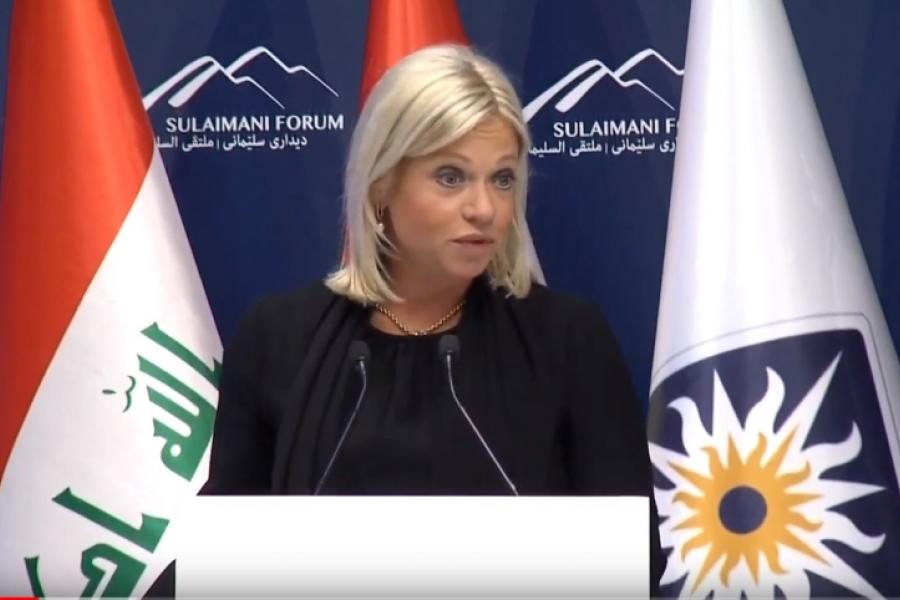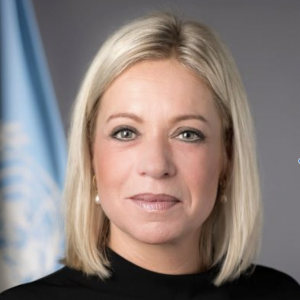Reviving Public Trust: A Necessity Keynote address to the Sulaimani Forum by the SRSG for Iraq, Ms. Jeanine Hennis-Plasschaert
Excellencies,
Ladies and gentlemen,

In the invitation to this forum, it was stated that there are many political and economic issues to be addressed in the aftermath of last year’s federal and Kurdistan regional elections.
Very true indeed. One can certainly not deny that the road to well-deserved sustainable stability in Iraq will be long and far from easy.
There are so many issues to be resolved.
In this regard, I should begin by saying that I will speak candidly today. My comments aim to be both challenging and thought-provoking, so that we can attempt - honestly and constructively - to address some of the deep-rooted problems within Iraqi processes and institutions.
Only by focusing on these systemic concerns will it be possible to revive public trust in the government, to revive public trust in state institutions and to restore faith in the nation as a whole.
Clearly decades of conflict and economic hardships have caused deep scars in Iraqi society. Iraqis have sacrificed a lot. And also the more recent sectarian legacies, ethnic tensions and internal political strife have added to the distrust among the religious and ethnic groups, have added to the distrust between political leaders and their constituents.
At the same time, in this period of post-conflict recovery, Iraq finds itself at a critical juncture. Iraq finds itself on a path whereby realism and great determination will be necessary in facing the challenges ahead. And not only that. Political and societal will is a precondition, obvious ownership and engagement of all Iraqi components and communities will prove crucial. And it goes without saying that a sense of urgency to see and feel the need for a turn-around is essential.
However, to date, the government formation remains incomplete in both Baghdad and Erbil. Nine months and five months, respectively, after elections.
Political infighting and factional politics seem to be the rule. Parliamentary committees have yet to start their substantive work. Is it any surprise that the sense of public disillusionment remains high? Is it any surprise that people do not believe that the political process serves them or that it can bring about institutional change?
Can we shy away from the lack of viable and responsive institutions, from the lack of capacity to follow-up on important decisions, from the deadlock between ruling elites, from the sectarian militarism, from the fragmentation along ethnic or religious lines? No, I would say, as all of this continues to play out at the expense of the Iraqi people.
Ladies and gentlemen,
The entire country feels proud when watching the Iraqi national football team play. At the same time, many people continue to tell me that they do not see how a national identity can go hand-in-hand with their other affiliations.
So, one big question is: how can we collectively promote a sense of pride and confidence in the country? After all, Iraq needs a renewed sense of patriotism to re-emerge stronger.
As divisions in the country remain an underlying problem, part of the solution must be to engage in sustained and meaningful national and community reconciliation to bridge the differences and grievances, to accept others and - where needed - to apologise to others, to respect each other’s special history, to build social cohesion and thus to move towards a sense of national unity.
Within this context, political, community and religious leaders should play a central role to build tolerance and counter extremist ideologies. For leadership failures and the rise of violence are closely connected.
Community activists, including youth leaders, require much greater support than at present. The lack of meaningful participation by some minority groups is also of serious concern. And excluding women from the political process, is to ignore half of Iraq’s potential, half of Iraq’s talent and half of Iraq’s energy. The country cannot afford to do that.
The good news is that last year major political parties, for the first time in national elections, did reflect upon the diversity of Iraq and the need for a national narrative. As a consequence, the sectarian divides of the past were replaced with cross-sectarian political alliances.
However, half of the voting population decided not to exercise its democratic right, thereby sending a strong signal of a growing grassroots scepticism over whether politicians are able to meet the people’s expectations.
Ladies and gentlemen,
Hundreds of millions of dollars in aid and development-funding have poured into Iraq in recent years, but living conditions across much of the country remain shockingly poor.
Iraq is a country with a very substantial revenue from its hydrocarbons sector and yet many of its citizens live in poverty, illiteracy, ill-health and unemployment. How is that possible?
Part of the answer lies in corruption. Corruption is pervasive across all levels in Iraq. One shall not be allowed to unjustly enrich himself at the expense of another. Yet, it is happening in so many ways.
‘Transparency International’ reported that out of 200 countries, only 12 are more corrupt than Iraq. If the country is to retain and expand international investment and support this problem will need to be tackled urgently. Representatives of donor countries are continuously telling me that they are getting tired of fighting the Iraqi system for the privilege of helping the country.
The fight against corruption will not be an easy one. But if there is any hope to revive public trust the interests of the Iraqi people and the nation as a whole should be placed above individual enrichment.
Ladies and gentlemen,
Citizens call for tangible improvements in their everyday life. They ask for water that they can drink without fearing it will make them ill. They ask for having access to irrigation water for agriculture. They ask for reliable electricity supply so they do not have to use expensive and polluting generators. They ask for a functioning garbage disposal system to keep their streets free of trash. They call for a developed economy that allows youth to find jobs. They call for a balanced distribution of revenues across the country. They call for proper education, for accountability, for justice.
Law-abiding citizens are looking for reassurances. A woman needs to feel safe going down a street, speaking her mind and dressing the way she wants. A writer needs to be reassured that his life is not threatened for airing his views in public. And parents need to know that their children can go to school in safety. These are the basic things in life.
And whether we like it or not, simmering anger easily swells. And a failure to act will inevitably lead to a new cycle of violence.
Ladies and gentlemen,
Another major concern with regard to Iraq’s security and stability relates to those armed groups operating outside state control, some of which have transitioned to little more than criminal gangs, expanding their economic and social influence throughout the country.
For instance, and as we speak, Iraqi citizens are confronted at illegal checkpoints by armed men extorting their money. Displaced people returning to their homes are suddenly expected to pay so-called loyalty fees. Farmers in the fields are being forced to pay bribes or lose their livestock.
These practices are adding to the many hardships that returnees and other vulnerable populations are already experiencing on a daily basis. It is a very serious problem one cannot afford to ignore.
Resolute action against all this is of the greatest importance for a stable Iraq, for boosting the morale of its people.
Ladies and Gentlemen,
In addition to domestic stability, Iraq needs to promote regional security through expanded relations with its neighbours as well as others. And the ongoing sustained outreach to other states, rightly positioning itself as a reliable and capable partner, is the way forward indeed. A great piece of diplomacy. Iraq can be the stabilising factor in a turbulent region. Indeed, Iraq can be the bridge, the arena for regional conciliation.
At the same time, Iraq faces serious challenges in preventing its territory from being used as an arena for different competitions. It is imperative that Iraq be allowed to pursue its own national interests without outside interference. Putting an extra burden on Iraq is the last thing it needs.
Ladies and Gentlemen,
In conclusion, I believe that the key to national recovery and progress is through building public trust and social cohesion, ensuring the delivery of public services, kickstarting the economy, tackling corruption and establishing state institutions that are fit for purpose, without delay.
To achieve this, a sustained, constructive dialogue among political factions, components and communities is desperately needed, placing national interests above partisan interests. And as I said: obvious ownership and engagement of all Iraqi components and communities will prove vital. Political and societal will - at all levels - is a precondition. Otherwise, the country risks leapfrogging from one crisis to another.
Continued support from the international community will be pivotal, too. I will therefore continue to encourage the international community to work alongside the United Nations to provide support to humanitarian, stabilization and development efforts.
The UN family remains strongly committed to assisting the Government of Iraq in all of these processes, in accordance with our mandate and in the interests of the Iraqi people.
Iraqi’s of all components and affiliations live here since time immemorial. I sincerely hope that a tipping point will be reached where the people of Iraq, regardless of their ethnic, religious or political affiliation, commit to investing in a common destiny in an Iraq where peaceful coexistence is the norm, based on respect for human rights and the rule of law.
I am optimistic by nature, and I stand ready to serve. Iraq has immense opportunities and great potential. This beautiful country, with all its diversity, is truly close to my heart.
Thank you.
صاحب الخطاب




